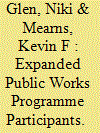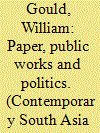| Srl | Item |
| 1 |
ID:
182491


|
|
|
|
|
| Summary/Abstract |
The Expanded Public Works Programme (EPWP) was developed in South Africa as a strategy for job creation amongst poor people. However, this desired outcome of EPWP is often not achieved. This research follows an action research approach to analyse the potential of two organisations to collectively help overcome development gaps and improve living, learning and working conditions for EPWP participants. A new framework is proposed that will support all collaborating organizations to achieve their common objectives of overcoming poverty and unemployment and providing opportunities in rural areas for vulnerable people to earn an income. The research assesses the opportunities for collaboration between the organizations to help create business opportunities in tourism once participants exit the EPWP programme. This study included some primary data collection and adds new insights to the body of knowledge that deals with effectiveness of EPWP programmes in achieving objectives of poverty alleviation and job creation.
|
|
|
|
|
|
|
|
|
|
|
|
|
|
|
|
| 2 |
ID:
152349


|
|
|
|
|
| Summary/Abstract |
In moving away from older linear narratives around the costs and benefits of ‘corruption’ to development and democratic processes, social scientists have tended to downplay temporality in their work on the phenomenon in the global South. Historical research, however, offers a different kind of nuance around moments in which corruption becomes important in political and administrative discourse. Examining archives on corruption in detail and comparatively poses different questions about the operation of the everyday state. It also provides alternative means for exploring the nature of citizenship, national belonging in India and how the disempowered are often unevenly affected by corrupt acts. Using two case studies in the Public Works Department during state transition in the late 1940s and early 1950s, in India’s most populous state, Uttar Pradesh, this article examines how archives convey multiple and contingent meanings to early postcolonial discourses of ‘corruption’. Such archives present the phenomenon as a vehicle or symbolic resource for larger political processes over the period. This potentially challenges our perspective on some of the larger questions surrounding the early postcolonial state, the nature of civil/political society in that period for India, ideas of national belonging and the relationship between India and Pakistan.
|
|
|
|
|
|
|
|
|
|
|
|
|
|
|
|